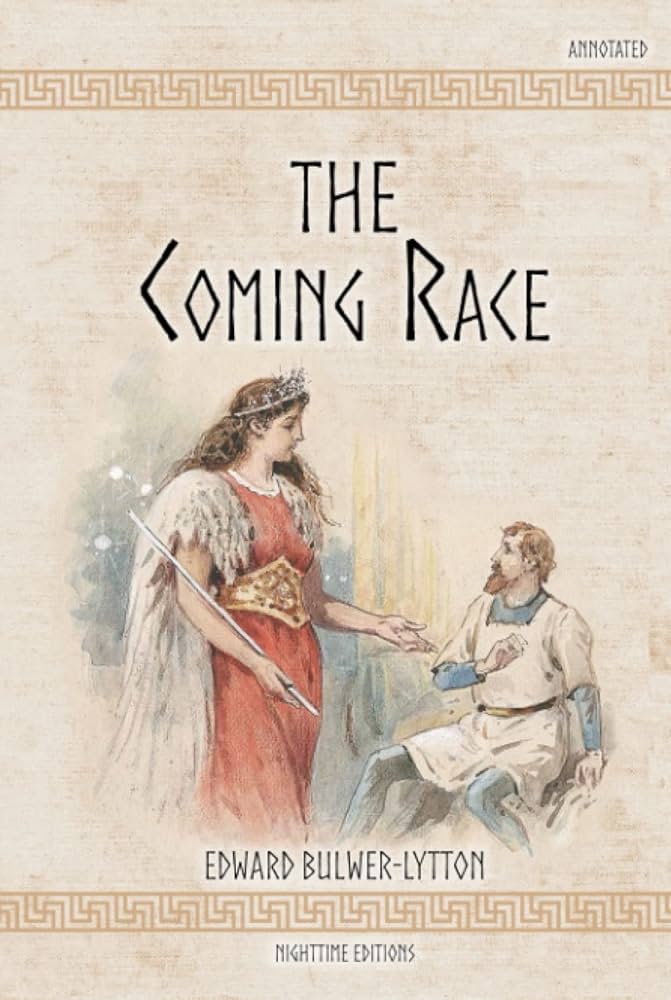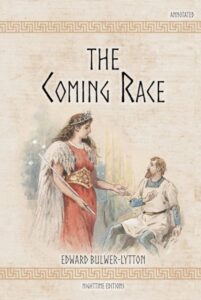Chapter XVII — The coming Race
byChapter XVII opens with an immersion into the rhythm of Vril-ya life, where the passage of time is neither dictated by the sun nor governed by outdated customs. Their day is precisely structured into twenty hours, distributed thoughtfully between work, recreation, and rest. This system reflects more than efficiency—it reveals how harmony guides even the most fundamental human activities. The absence of darkness is intentional, with continuous ambient lighting outdoors and a dimming system indoors to encourage sleep. Their mastery of illumination speaks to a culture that refuses to surrender to natural constraints. Instead of adapting to the world, they’ve reshaped it to suit their ideals. Their surroundings, designed for mental clarity and physical health, reflect a civilization that sees comfort as a responsibility, not a luxury.
Timekeeping in their world lacks mechanical clocks in common view; instead, music serves as their chronometer. Melodies played at regular intervals subtly mark the hours, infusing their environment with an artistic yet functional rhythm. This musical passage of time softens the experience of daily transitions and strengthens communal bonds. Even in structure, their society places beauty at the center. These melodies are not arbitrary—they are crafted to evoke peace and focus, guiding the community through each stage of the day. Such design reflects a belief that discipline and creativity are not opposites but allies. Life here flows rather than ticks.
Beyond structure, the Vril-ya enjoy remarkable health and longevity. Their climate, engineered for constancy, allows uninterrupted agriculture, ensuring nutritional balance year-round. Combined with a disciplined lifestyle and the use of vril in medicine, their lives extend far beyond human averages. Disease is nearly nonexistent. Emotional strain, the root of many illnesses above, has been reduced through cultural stability. Without war, want, or political unrest, they face few of the pressures that shorten lives elsewhere. Their calm hearts beat slower but longer. Theirs is not a hurried life—it is a deliberate one.
However, this perfection comes at a cost. The arts, particularly literature and drama, have diminished over time. In a society where conflict is absent and equality reigns, the tensions that drive poetry, storytelling, and artistic exploration no longer resonate. Drama, rooted in suffering or ambition, finds no audience here. Their libraries hold works from a more turbulent past, but few new pieces emerge. Creativity that once flourished through hardship now seems unnecessary. What remains is technical writing, historical record, and philosophical commentary—valuable, but emotionally dry. Passion has been pacified. The canvas is smooth, but the brush seldom moves.
A discussion with Aph-Lin further deepens this reflection. He explains that as their civilization advanced, the need for art as catharsis faded. Inequality and striving gave birth to genius, but those engines have long since been shut down. The Vril-ya regard these earlier works as relics—powerful, but belonging to an age they’ve surpassed. For them, progress meant leaving behind the turmoil that inspired much of human expression. Yet, the narrator wonders if something vital was lost. Can peace replace the fire that once drove creation? Or does stability slowly silence the voice of the soul?
This question lingers. The Vril-ya have traded the chaos of progress for a serene stasis. What they’ve gained in peace, they may have lost in depth. Their lives are longer, healthier, more secure—but do they feel less? Emotion has not vanished, but it no longer governs. Their joys are calm, their sorrows muted, their ambition reshaped into service. The narrator begins to sense that progress without friction may lead to stillness, not growth. In seeking perfection, the Vril-ya have created a world immune to inspiration. And while their world dazzles, it also leaves him wondering if suffering and aspiration are not curses, but hidden gifts.
As this chapter closes, the narrator’s admiration is tempered by doubt. The Vril-ya live wisely, but perhaps too wisely. Their path has led them to peace, yet he cannot shake the feeling that something essential has been left behind. Not wealth or comfort, but the wild, painful, beautiful chaos that gives art its heartbeat. He sees their light—but questions what shadows were lost in its making.


